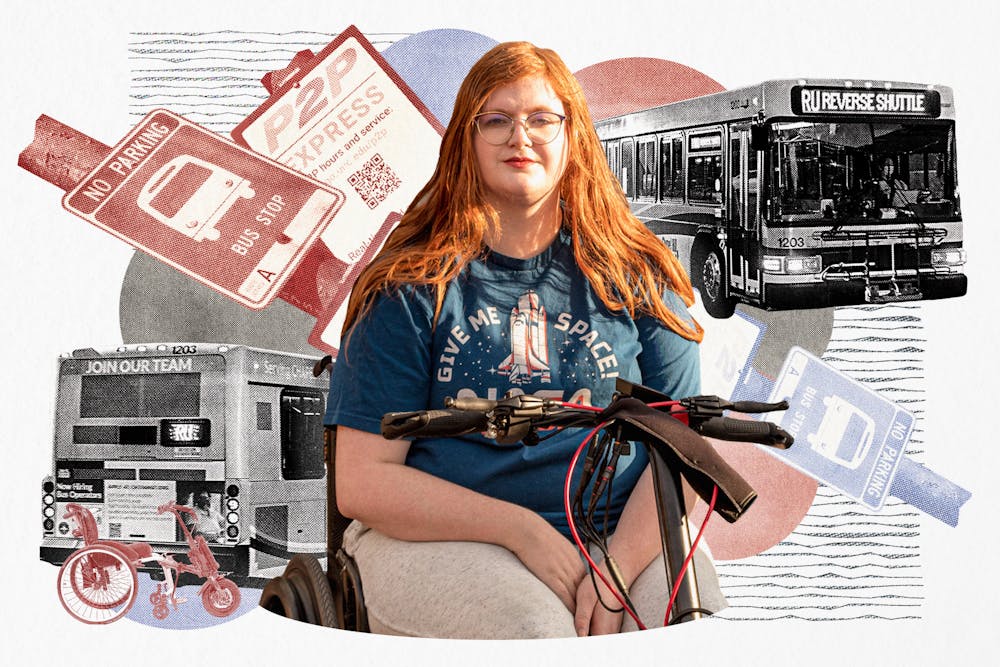“She was like, ‘Well, you either leave it on and get on the bus or you figure something else out,'” Ferguson recalled.
Four transit passengers ended up lifting Ferguson on and off of the bus. She said the experience made her feel like a “piece of furniture.”
Bus operators can’t touch a part of someone’s mobility aid if it is not attached to their main device. Powell explained that this is because CHT does not want operators to accidentally break things that they aren’t familiar with or hurt themselves.
The CHT operator couldn't touch the Firefly device once it was detached from Ferguson's wheelchair, though they could have assisted if it was.
“It was so bad that as soon as I got off that bus, I called my mom and I was like, ‘I want you to come and take me the hell out of here,'” Ferguson said.
Ferguson also said that buses have often passed her at designated stops even when the buses aren’t full.
She studies studio art at UNC and is taking a class in the Art Lab at 108 Airport Dr. this semester. She now uses UNC's P2P on-demand accessible transportation services to get there, but she noted the service's unreliability. She said she has sometimes had to wait 30 minutes for her ride request to be approved.
These are not Ferguson's first experiences of accessibility issues — she's also faced them on UNC's campus. This semester, she was stuck on the third floor of Hanes Art Center because of a broken elevator for over seven hours.
Her decision to not use Chapel Hill Transit buses has limited where she can go.
“It’s not worth it for me to take a bus and risk ending up in a situation where I'm humiliated and dehumanized,” she said.
Accessibility collaboration
A few weeks ago, Ferguson reached out to CHT about her negative experiences with bus operators. CHT invited Ferguson to the bus garage so they can learn how to better accommodate her Firefly attachment. She said their meeting is slated for next Friday.
To get the day's news and headlines in your inbox each morning, sign up for our email newsletters.
While she is glad CHT is attempting to improve bus accessibility, Ferguson thinks addressing operator training is more important.
Though buses can be lowered to curb height, have ramps and include straps to secure mobility aids, Ferguson said they aren’t accessible if the people operating them haven’t been properly trained.
“We are trying to rectify that situation and solve it by having a conversation with her and having her out to our facility, and doing some extra continuing education with our operators about the next generation of mobility devices,” Powell said.
Chris Hodgson, a supervising attorney for the advocacy group Disability Rights North Carolina, said transportation-related Americans with Disabilities Act grievances are not uncommon.
“It's a problem where things have never really caught up to where things have been implemented to be truly accessible,” Hodgson said.
According to a statement from Chapel Hill Transit Director Brian Litchfield, new bus operators are trained for eight to 12 weeks depending on prior experience.
This program includes ADA sensitivity training. Trainees learn how to assist people with mobility devices and aids, which includes maneuvering on and off the bus in a mobility device and practicing securing various mobility devices.
“These training modules include in-person classroom training, video instruction and trainees working directly with instructors on the different styles of buses to secure mobility devices/aids,” Litchfield said in the statement.
Ferguson said she agreed to CHT's offer to visit the bus garage in the future and she hopes further bus operator training will allow the transit system in Chapel Hill to become accessible for all of its riders.
@emmymrtin | @DTHCityState
city@dailytarheel.com | elevate@dailytarheel.com
Emmy MartinEmmy Martin is the 2023-24 editor-in-chief of The Daily Tar Heel. She has previously served as the DTH's city & state editor and summer managing editor. Emmy is a junior pursuing a double major in journalism and media and information science.





